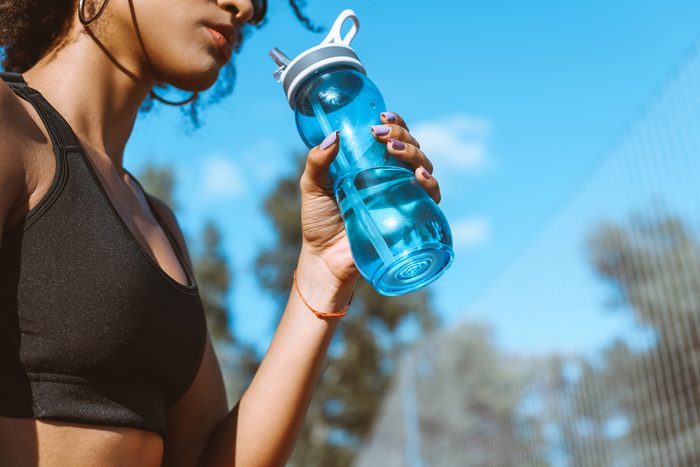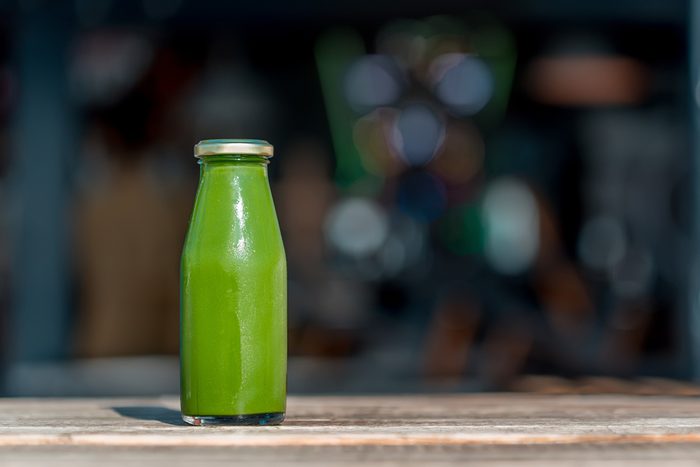
Feed a cold, starve a fever
It’s a catchy little catchphrase, but it doesn’t withstand scientific scrutiny. Well, not all of it, anyway. Elroy Vojdani, MD, a functional medicine practitioner and the founder of Regenera Medical in Los Angeles, explains that the first part is sound. “When the immune system is battling an infection, it uses a tremendous amount of energy, and the calories from food intake can certainly help fuel the immune response and ensure a speedy recovery.”
The second part, however, is where things go awry. “The amount of energy used to fight an infection goes up exponentially when a fever is involved,” says Dr. Vojdani. “You, in fact, need more calories to help keep up with the energy depletion of a fever.” The smart path, he says, is to consume healthy calories—but without overdoing it and stressing your intestinal tract. He suggests easy-to-digest, nutritious, and hydrating foods like bone broth, and adds that you should also make sure to drink plenty of fluids and get ample rest. Whatever you do, avoid these sneaky ways summer can make you sick.

Take an aspirin a day to keep your heart healthy
For decades, the medical community insisted that everyone over a certain age should ward off heart disease with a daily dose of aspirin because of its blood-thinning properties. It’s no wonder that so many people still believe that claim, despite new studies debunking it. According to one study of nearly 20,000 people from the United States and Australia published in the New England Journal of Medicine in 2018, taking an aspirin a day does not prolong the lives of healthy, elderly people, and, in fact, it increases the risk of hemorrhage. Another study published in JAMA Neurology in 2019 found that daily aspirin use is linked to an increased likelihood of intracranial bleeding.
For people who have had a stroke, heart attack or undergone a cardiac procedure, popping an aspirin a day might still be a good idea, but that should be determined by your doctor.

You need to drink eight glasses of water a day
While this isn’t a bad rule of thumb, it’s not 100 percent accurate either. How much water you really need is highly individualized and depends on body size, activity level, and even genetics since sodium levels in sweat differ from person to person, says Kylene Bogden, RDN, a Cleveland-based registered dietitian nutritionist who works with NBA athletes and is the co-founder of FWDfuel Sports Nutrition. Some people need less, but many people need more. How can you tell how much you need? “It’s about listening to your body and knowing how you feel,” says Bogden. “In regard to dehydration, are you going poop every day? Is your energy stable throughout the day without crashes? And if you’re highly active, do your muscles and joints feel good? That’s really how you gauge it.” It’s also important to note that you don’t have to get all of your water from straight-up water. Foods like watermelon and spinach are comprised of nearly 100 percent water. (Here are other hydrating foods to boost your water intake.)

Brown sugar is healthier than white sugar
All sugar, no matter the type, is equally problematic if you consume too much of it. “Brown sugar and turbinado (raw) sugar do have slightly fewer calories per gram and a small amount of minerals (mostly calcium and potassium) that are likely inconsequential,” says Dr. Vojdani. “They do, however, have an identical glycemic index to white sugar, meaning that they have the exact same potential to do harm to your metabolism.” He recommends sticking to sweeteners with a lower glycemic index, like coconut sugar, maple syrup, or agave syrup. And, in general, do your best to limit your sugar intake. The Heart and Stroke Foundation of Canada recommends a maximum of 12 teaspoons of added sugar per day.

Eating before bed makes you gain weight
While studies have shown that regularly eating junk food or large meals late at night can indeed contribute to weight gain and other health problems, experts are rethinking their stance on more responsible nighttime snacking. Data suggests that small, nutrient-dense foods before bed can lead to positive physiological changes in terms of muscle protein synthesis and cardiometabolic health, according to an article published in Nutrients.
If you’re hungry, Bogden suggests eating a snack that has a little bit of protein and a little bit of fat, and no added sugar—something like a handful of nuts, an apple with nut butter, or hummus with veggies. She also advises leaving at least an hour (ideally two) between your snack and your snooze. “There’s a saying, ‘Rest and digest.’ The gut needs to calm down, digest your food, and seal itself off before you sleep. [Otherwise] you’re half-digesting your food and then not sleeping because your body is struggling to do two massive tasks at once—digest and sleep—and you can end up sluggish and bloated the next morning.” To curb your late-night cravings, check out these healthy snacks.

Don’t crack your knuckles—it causes arthritis
Hearing that satisfying (or annoying, depending on your perspective) pop in your knuckles can’t be good for you, right? Well, it may not be good for you, per se, but experts agree that it doesn’t lead to arthritis. That “cracking” sound is actually caused by the bursting of gas bubbles in the finger’s joint fluid, according to Harvard Health experts. One study published by the journal Hand Surgery and Rehabilitation also found that knuckle-cracking didn’t negatively impact grip strength, something that had been an earlier concern. That said, there have been rare cases of tendon injuries and joint dislocations related to attempted knuckle-cracking.

Gluten-free foods are healthier
Gluten-free foods aren’t inherently healthier, and, in fact, they could be unhealthier than you think. “The majority of gluten-free replacement products at the supermarket are made with ultra-processed grains and powders and contain large amounts of stabilizers and gums, which are undoubtedly bad for you,” says Dr. Vojdani. “Be mindful of this and choose products that focus on whole foods rather than processed ones and you’ll be doing the gluten-free diet the right way.” By no means does everyone need to give up gluten, but if you think that you have celiac disease—in which the protein in wheat, barley, and rye causes gastrointestinal issues, joint pain, and fatigue—or a gluten sensitivity, talk to your doctor about being properly diagnosed and devising a healthy food plan. Dr. Vojdani adds that some people with autoimmune diseases might also benefit from a gluten-free diet and suggests following it for four to six weeks to see if there’s an improvement.

You need to drink milk for strong, healthy bones
It’s not necessarily milk that does a body good—it’s calcium, and you can get that from a variety of non-dairy sources (though a glass of milk is an easy way to get a large dose of it). “Needing to drink milk for strong bones because of the calcium content is just plain false. There are tons of foods that are rich in calcium outside of cow’s milk: almonds, broccoli, chia seeds, kale, beans, and lentils, to name a few,” says Dr. Vojdani. “Choosing vegan sources of calcium can add anti-inflammatory properties to your diet and have the added benefit of being environmentally friendly.” So how much calcium do you need? According to the National Institutes of Health, most adults need 1,000 milligrams per day. Women over 50 and men over 70, however, should get 1,200 milligrams, while children’s needs vary depending on their age, with those between nine and 18 needing the most (1,300 milligrams). If you notice any of these signs, you’re not getting enough calcium.

If you drop food on the floor, it’s safe to eat as long as you pick it up within five seconds
No matter how badly you want to eat that food you’ve dropped, you shouldn’t. It can be contaminated with bacteria the second it touches the ground, according to a study published in the journal Applied and Environmental Microbiology, and it will acquire more bacteria the longer it stays there. The researchers found that tile and stainless steel caused the most bacteria transmission, while carpet had a very low transmission rate.

You can skip sunscreen if you have dark skin
This advice is not only untrue but also very dangerous. Everyone needs to be smart about the sun and vigilant about sunscreen. While a higher concentration of the pigment melanin can block some UV rays and lessen your chances of developing a sunburn, according to the Canadian Cancer Society, you can still absolutely get skin cancer (and a sunburn). In fact, a 2016 study published in the Journal of the American Academy of Dermatology found that even though Caucasians are more likely to develop melanoma, African Americans are more likely to learn that they have it in its later stages and to die from it. (To protect your skin, check out these dermatologist-approved face sunscreens.)

Detoxes are important to get rid of toxins and jump-start weight loss
It’s the liver’s job to detox your body, and it can handle a little overindulgence. If you’re overindulging regularly, you’ll need a lifestyle change to make sure that it keeps working optimally. Plus, according to Johns Hopkins Medicine, detoxes and cleanses aren’t regulated by the Food and Drug Administration (FDA), which means they haven’t been tested in clinical trials. A review of research published in the Journal of Human Nutrition and Dietetics found that many of the studies on detoxes that do exist employed flawed methodologies, had small samples sizes, or were performed on animals. But what about possible weight loss? While you may initially see some pounds come off, it’s likely due to the detox’s restricted calories, and as a result, the weight loss likely won’t last.

Carbs make you gain weight
All carbs are not created equal. Yes, some can contribute to weight gain—namely, refined carbs such as white flour, white bread, and white rice. But complex carbohydrates, found in foods like brown rice, oatmeal, and whole-wheat flour, can actually help you lose weight, according to a 2017 study published in the American Journal of Clinical Nutrition. In the study, participants who consumed whole grains burned around 100 more calories per day, as well as had increased metabolic rates and fecal energy losses, than those who consumed refined grains. Plus, “good” carbs contain fibre or protein and keep you full longer. Of course, you shouldn’t go crazy with the carbs (or most other foods), but if you stick to the daily recommended intake, you could reap the benefits of weight loss and improved overall health over time.
Next, read up on the health mistakes people make every day.
